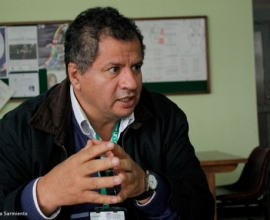Independent information on medicines as a mechanism of social cohesion
02/12/2015
PrintJosé Julián López, Director of Medicine Information Centre of the National University of Colombia (CIMUN)
The concept of social cohesion is not easy to define and therefore can be interpreted, from a sociological standpoint, as the degree of consensus between the members of a social group, or as the perception of belonging to a common project or situation. In other cases it is conceived of as the ideal solution to the tensions and social problems of modern cities, issues like social exclusion, poverty, and violence. It can also be seen as the constant interplay between social inclusion and exclusion mechanisms (health, employment, and well-being policies, among others) and citizens' responses to and perceptions of the way in which these mechanisms act and which translate into a sense of belonging to society. In summary, social cohesion refers to this “space” in which social policies make people form part of society and feel that they do. (1)
For EUROsociAL, it is related to equal opportunity based on well-being and a sense of belonging, and to solidarity—values that represent societies united around a common project. (2)
The question now arises of how this concept can be made to mesh with that of independent information on medicines. It should be noted that medicines represent a very hefty portion of total healthcare spending, and moreover constitute the most-used therapeutic intervention in healthcare. Considering the speed of technological development and the growth in the cost of therapies, there is a need to construct a project involving healthcare systems in countries with limited resources: rational use of medicines.
The policy aims to resolve difficulties in proper use of medicines as the main axis, including the development of pharmaceutical services as a strategy for continuous improvement of the space where they are most frequently used, as well as to correct defects in the quality surveillance and control system, and reduce inequities in access. It should be stressed that medicines have a reactive nature with respect to health policies, unlike the prevention and promotion policies that any true health system requires. Therefore, it is necessary to generate a culture that minimises waste, misuse, and abuse of medicines. (3)
The main factor generating improper use of medicines is precisely asymmetry in access to objective, clear, and targeted information. The consequence of this is the high number of trade names the industry places on the market, creating confusion and making it impossible for doctors to know the characteristics of all them, and their sale price, which creates a tendency to prescribe the brands with the most effective marketing efforts behind them, facilitating the work of advertising campaigns and discretionary pricing. Along these same lines, brand names or fantasy names do not indicate the pharmacological composition of the products, while generic product names do assure this recognition. The major laboratories pressure doctors through scientific documentation, marketing materials, free samples, financing of events and publications and a prestigious group of medical sales representatives. In addition, the laboratories' campaigns increasingly aim advertising at the general public. New products are advertised in the mass media by describing the numerous diseases or symptoms for which the medicine in question is supposedly exceptional, creating high expectations on the part of patients who eventually end up transmitting these to their doctors, thus closing the circle of induced demand (4).
As a response to health professionals' need for information, the growing volume of scientific information in all media (especially the Internet), the ever-expanding market, and the pharmaceutical industry as the main source of information for prescribers, there is a need to produce and disseminate information that is reliable, relevant, accessible, centred on prevalent therapeutic problems, and based on quality and independent scientific studies by the manufacturer. Medicine Information Centres and independent information bulletins are the response to this need, but governments need to give them the central role in constructing the national pharmaceutical policy in order to achieve the objectives of access, quality, and rational use of medicines.
Hence, Colombia's national programme for rational use of medicines and its national pharmaceutical policy, with the support of EUROsociAL and other international organisations, has established production of independent therapeutic information through the Medicine Information Centre of the National University (CIMUN) as one of its strategies. This information is initially aimed at prescribers, but in a second phase it will be oriented towards public health education in general.
Bibliography
- Social cohesion and social policies for more inclusive societies in Ibero-America. 27th Ibero-American Summit of Heads of State and of Government. 8th, 9th, and 10th November, 2007, Chile. Available at: http://segib.org/es/node/5107
- Social cohesion. Available at: http://eurosocial-ii.eu/es/pagina/cohesion-social
- PFN: http://apps.who.int/medicinedocs/documents/s18068es/s18068es.pdf
- Gonzales García Ginés, Catalina de la Puente, Sonia Tarragona. Medicamentos: salud, política y economía. 1st edition, Buenos Aires: ISALUD, 2005. 256 p
José Julián López, Director Centro de Información Medicamentos de la Universidad Nacional de Colombia (CIMUN)

